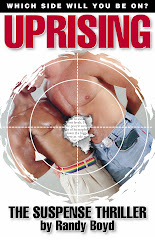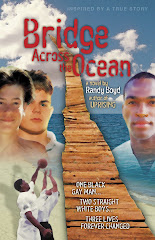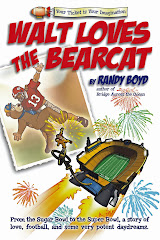 The following interview originally appeared in the November 23, 1998, issue of IN Los Angeles Magazine, in conjunction with my first novel, Uprising.
The following interview originally appeared in the November 23, 1998, issue of IN Los Angeles Magazine, in conjunction with my first novel, Uprising.Feeling Randy
Probing the mind of new author Randy Boyd and his Uprising
by Alan Carter
Imagine Prince, Ted Turner and Michael Jordan are secretly gay. Then imagine they conspire to fund a covert operation to bump off a homophobic U.S. Senator (think Jesse Helms.)
Such is the story in a provocative and compelling new tome by Randy Boyd, a black, openly gay and HIV-positive writer, who has fashioned Uprising, a story that is decidedly not politically correct.
Prince, Turner, Jordan and Helms do not appear by name, of course, but the characters---the single-named Othello (a black, HIV-positive rocker), Jasper Hollinquest (a billionaire), Deon Anthony (a streetwise basketball hero) and Sen. Jimmy Herman are all archetypes, says the
 author. Boyd has also created the character of Raider Kincaide, a strapping, blond, homophobic FBI agent who is sent undercover (both literally and figuratively) to try to stop the movement.
author. Boyd has also created the character of Raider Kincaide, a strapping, blond, homophobic FBI agent who is sent undercover (both literally and figuratively) to try to stop the movement.Boyd, a UCLA grad, divides his time between Indianapolis and Los Angeles. The story---part thriller, part love story---adds up to a morality tale that basically asks the reader: is violence ever justified? IN Los Angeles recently sat down with Boyd and asked about the journey that got this book published.
IN LA: Reading the book, I was torn. I'm a pacifist, but I wanted the Senator to get killed. A lot. [Laughs] And that disturbed me.
Randy Boyd: That was kind of the point behind the book. Being a black gay man with HIV is one thing. Hearing the kinds of things the Jesse Helmses of the world spout only add to [the difficulties we as gay face.]
"Could I point a gun at a homophobe?"
IN LA: Jimmy Herman and Jesse Helms? No need to be subtle there, huh?
RB: [Laughs] Othello was actually three people in my head: he had the success of a Michael
 Jackson, the sexuality of Prince and the machismo of Bobby Brown. I'm not saying any of these men are gay; it's just a novel.
Jackson, the sexuality of Prince and the machismo of Bobby Brown. I'm not saying any of these men are gay; it's just a novel.When I started writing, Ellen Degeneres hadn't come out. Really, no highly prominent gay men have. I would love for this book to [inspire] some high-profile male celebrity to say, 'I have enough money and power. Okay, why not?' I think gay men need a Jackie Robinson like that. Someone---he doesn't have to be black---to come out and take the heat and the torture.
IN LA: You seemed to be equally at home writing about sex and politics.
RB: [Laughs] Well, I'm much more into the sex than the politics. But even sex becomes political when you're a black gay man---with or without HIV.
"No one knew anything about my sexuality. I was wearing a mask."
IN LA: When I saw people protesting at Matthew Shepard's funeral, it made me and a lot of people, ballistic.
RB: We're all torn. In a civilized society, you can't go around thinking about bashing someone's
 head in, but when you hear about Matthew Shepard or the other acts of hatred, doesn't it make you angry enough to want to bash someone [back]?
head in, but when you hear about Matthew Shepard or the other acts of hatred, doesn't it make you angry enough to want to bash someone [back]?I kept asking myself while writing the book: could I point a gun at a homophobe like a Jesse Helms or a Rev. Fred Phelps? If I'm on the jury, I couldn't convict anyone who got rid of Phelps. I mean, picketing someone's funeral?
IN LA: I was also struck in the book by the search for love. Othello, for example, is very popular yet he is alone.
RB: I was a cheerleader in college and that made me known on campus, but I went home to an empty bed and no one knew anything about my sexuality. I was wearing a mask. That's one reason Othello goes out in disguise. He thinks he can't be seen as a gay man and realizes--later--that being in disguise is a complete waste of time.
There's a part of me in all the characters. Even---if I have to be totally honest---the anti-gay people. I mean, we all grew up internalizing homophobia.
"I did this book for the soul."
RB: I definitely wanted the quote unquote legitimacy of the big N.Y. Guys. I shopped the book
 around, and many of them liked it. But they were scared of it. It didn't fit into any of their niches, they didn't know how to sell it.
around, and many of them liked it. But they were scared of it. It didn't fit into any of their niches, they didn't know how to sell it.IN LA: Well, in their defense, there aren't many novels about rich gay black men who conspire to kill a U.S. Senator while falling in love with a white homophobic FBI agent.
RB: [Laughs] You're right. One of the “big guys” wanted to make it Raider's story. They were also talking about a movie. You know, the straight white guy going undercover into the gay world. I'm sure that would be a wonderful story, but it's not my story.
IN LA: Most new writers would find that hard to turn down. Especially since many new writers want to make money.
RB: [Laughs] If I really wanted to make money I wouldn't be writing stories about gay people, period. I'd be writing Jurassic Park or The Firm. I did this book for the soul.
IN LA: How does your soul feel now?
RB: [Laughs] I gotta tell you, I get so much wood looking at this book. From birth, we as gay
 people go to the movies and we read books and it's all boy meets girl and they have told those stories thousands of times---so many times [that] they've run out of ways to tell it. And I was so tired of seeing that.
people go to the movies and we read books and it's all boy meets girl and they have told those stories thousands of times---so many times [that] they've run out of ways to tell it. And I was so tired of seeing that.I want to see boy meets boy and black boy meets whatever kind of boy. And I want to see us in danger, and having comedy and romance in our lives. I loved Titanic, but I said to two gay friends, “Wouldn't that have been great if it was two men falling in love instead?” And they were like, “noooo.” We're conditioned to not want to see ourselves.
IN LA: Could you see Uprising the movie happening the way you want it, with the story being told from the black and gay perspective?"I knew a lot of black men might be upset."
RB: I can already see [the ad campaign.] The story isn't just about whether or not the
 assassination takes place, it's about, 'Will these two guys sleep together? I'd say, 'If you haven't seen it, don't ask. If you've seen it, don't tell.”
assassination takes place, it's about, 'Will these two guys sleep together? I'd say, 'If you haven't seen it, don't ask. If you've seen it, don't tell.”IN LA: The book also heavily promotes interracial romance.
RB: Othello had to have a weakness for blonds for the story to work. There's a line in the book, where Othello is running his hand through Raider's hair, and he said it was like God combing a field of wheat.
I knew a lot of black men might be upset [at the idea that their hair wasn't as good as a white man's.] But that wasn't what I was saying. I debated taking the line out several times, but ultimately left it in.
IN LA: You also know L.A. Very well from this book. There are really involved references to the
 Pride parade, the Spike ...
Pride parade, the Spike ...RB: I grew up in L.A., basically. I came to L.A. In 1980 when I was 18. And I was sexually active, naturally. And it was a hell of a time to be out, really, before we knew anything about AIDS.
IN LA: But I love how the Spike had a black bartender. Never when I've been there.
RB: [Laughs] He must be on vacation when you go. I've seen a black bartender in the Spike. I haven't been in a while. But all the L.A. Touches in the book came from real observation.
"We'll all rise up together. We'll be better people."
RB: The great thing about a book like this is that you can truly make anything happen. But it's
 hard to compete with real events. I mean, look at Iran-Contra. Or Clinton and Lewinsky. You couldn't make up stories like that.
hard to compete with real events. I mean, look at Iran-Contra. Or Clinton and Lewinsky. You couldn't make up stories like that.The rich and powerful are very capable of doing anything, certainly things beyond our scope. Anything is possible and that's the approach I took in writing this.
IN LA: Did you discover more about yourself by writing this book, or did your pre-existing beliefs make it an easy book for you to write?
RB: I have to commend you on that question. [Laughs]. That's one I've never been asked before. That one I have to think about. Hmmm, I have to say, off the top of my head, it was a combination of both.
The themes in Uprising reflect my past growth, more than anything I'm going through now. But
 then seeing Rev. Phelps protesting at Matthew Shepard's funeral brought up a lot of this old feelings in me again
then seeing Rev. Phelps protesting at Matthew Shepard's funeral brought up a lot of this old feelings in me againIN LA: Ultimately, what is the message of the book?
RB: Take the mask off. We're all wearing them. We've all been in those relationships, some romantic, some business, where we're not being totally real. Take off the mask and start your own personal uprising. We'll all rise up together. We'll be better people.
I came out when I was 26. I didn't see the need to come out before. And now I know it was pointless to hide. That's why I'm open about everything now. My sexuality, my HIV-status. Why hide it? I don't have time for that anymore.
Get Uprising at Amazon.com
Read an excerpt from Uprising
More on Uprising














